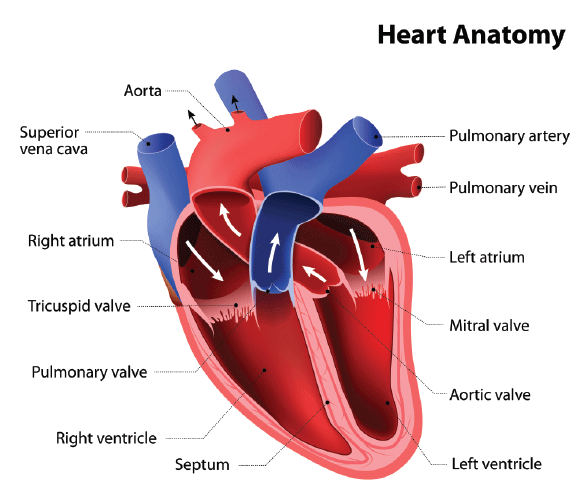Treatment & Specialties
What It Means if Your Dog or Cat Has a Heart Murmur
Michelle Oranges, DVM, DACVIM (Cardiology)
If you were recently told that your pet has a heart murmur, your own heart is probably racing! This can be a very stressful time. The goal of this article is to give you a better understanding of the cause of a heart murmur and the options moving forward.
Heart murmurs are caused by fast and/or turbulent blood flow, either within the heart or the major vessels leaving the heart. A heart murmur is typically considered to be an abnormal heart sound. However, this can be misleading, as there are non-pathologic, or “benign”, changes in blood flow that can result in a heart murmur. One of the most common benign causes is fast blood flow through an otherwise normal valve or outflow tract of the heart. This can occur from changes in the heart’s strength of contraction with stress, or variations in the size of the major heart vessels relative to the patient’s overall body size. There are also non-cardiac diseases that can result in a heart murmur, such as anemia (low red blood cell concentration) or dehydration.

Any heart murmur heard on exam, even those that are heard as an “incidental” heart murmur (i.e., one that is present in an otherwise asymptomatic pet), should lead to a discussion with your primary care veterinarian about the potential causes and options for further evaluation. Any heart murmur has the potential to be pathologic (i.e. caused by an underlying heart disease).
The most common pathologic causes of heart murmurs in young puppies and kittens are congenital heart diseases (i.e., something that the patient is born with). Possibilities include malformation of one of the four heart valves, abnormal obstructive tissue within the heart, flow through abnormal vessels, or defects in the walls of the heart. The most common cause of a heart murmur in older dogs is chronic degenerative valve disease, which is an age-related thickening and weakening of the valve tissue that results in a valve leak (the murmur heard on exam is caused by this leak). The most common cause of a heart murmur in older cats is different; while cats can have valve disease, the most common heart disease of older cats is an underlying disease of the heart muscle (cardiomyopathy), which may or may not result in a heart murmur.
Physical exam findings can typically be used to help determine the most likely cause of a heart murmur, and whether or not it is more likely to be benign versus pathologic. Details obtained from a physical exam include how loud the heart murmur is (graded on a scale of 1 to 6), where it is heard the loudest (known as the point of maximal intensity), when it is heard (e.g., during versus between heartbeats), and whether it is associated with another abnormal heart sound (known as a gallop sound). The physical exam is also used to assess the heart rhythm, heart rate, lung sounds, and other factors involved with blood flow (such as mucous membrane color and pulse quality). Together, these pieces of information allow doctors to determine the possible causes of the heart murmur and potential level of concern for significant underlying cardiac disease.
While physical exam findings are very helpful in beginning to determine the cause of a heart murmur, an echocardiogram (ultrasound of the heart) is necessary to confirm it. An echocardiogram allows for assessment of blood flow through the heart, while also evaluating the structure and function of all four heart chambers and visualizing the major blood vessels associated with the heart (e.g., the aorta and pulmonary arteries). For these reasons, an echocardiogram is the best way to understand prognosis. However, an alternative assessment that may be considered prior to an echocardiogram is taking chest X-rays. Chest X-rays can give a general impression of the heart size, particularly in dogs (this diagnostic tends to be less sensitive at assessing the heart size in cats). If heart enlargement is noted on chest X-rays, then an echocardiogram is often recommended to confirm the cause of the heart enlargement and determine subsequent treatment. Chest X-rays are also the main diagnostic test used to assess the lungs, which is necessary in patients with any underlying heart disease that could result in congestive heart failure.
When to pursue a cardiology appointment and echocardiogram should be discussed with your primary care veterinarian. In general, heart murmurs that are particularly loud (e.g., a grade 3/6 or louder), considered diastolic (heard between heart beats) or continuous in nature, or are associated with another abnormal heart sound or abnormal heart rhythm should be further assessed by a cardiologist. An echocardiogram may also be recommended prior to general anesthesia, even in patients with softer heart murmurs, to confirm their safety for undergoing a procedure. It is also important to note that there are several types of heart disease that are not associated with heart murmurs, or that may cause only a soft heart murmur even in the face of significant disease. For this reason, an echocardiogram may be recommended in any patient that has an abnormal heart rhythm or symptoms that may be due to heart disease, even if a heart murmur is not heard on exam, or if the patient only has a soft heart murmur.